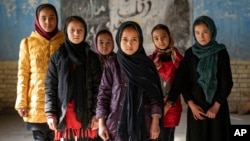Afghanistan’s Islamist Taliban have indefinitely barred girls from taking private university entrance exams, tightening their ban on women’s education in the country.
Ziaullah Hashmi, a spokesperson for the Taliban higher education ministry, Saturday confirmed to VOA they had sent out a letter to private Afghan universities across the country ordering them not to enroll female students for the upcoming spring semester.
The entrance exams are due to take place at the end of February. The letter warned those universities that did not enforce the edict would face legal action.
The Taliban have placed sweeping restrictions on women’s rights and freedom, excluding them from most areas of the workforce and banning them from using parks, gyms, and public bathhouses. They have barred girls from attending secondary schools beyond grade six since reclaiming power in August 2021.
Last month, the Islamist rulers abruptly closed universities to female students until further notice, and they forbade women from working for national and international non-governmental organizations.
The latest bans have sparked global outcry and demands for urgently reversing them. They also prompted the United Nations to send high-level delegations to Kabul this month to convey international concerns and urge Taliban leaders to ease the restrictions on women.
U.N. humanitarian chief Martin Griffiths traveled to the Afghan capital, Kabul, earlier this week to persuade the Taliban to lift the ban on female aid workers, warning it was undermining humanitarian programs in the war-ravaged country amid a prolonged drought.
Last week, U.N. Deputy Secretary-General Amina Mohammed, the highest-ranking woman official at the world body, led a high-level delegation to Afghanistan and met with senior Taliban officials to promote the rights of women and girls.
She told reporters in New York on Wednesday that the international community’s best leverage to persuade the Taliban to reverse curbs on Afghan women’s rights is the group’s desire for international recognition.
No foreign government has yet granted legitimacy to the de facto Afghan rulers, citing human rights concerns and their treatment of women.
The Taliban have refused to reverse the restrictions on women, saying they are in line with Afghan culture and Islamic law, or Shariah. The refusal has prompted donor nations to withhold financial assistance and retain the economic sanctions, with exceptions for humanitarian aid. Taliban and U.N. officials say the female education ban has kept more than 1 million girls out of schools.
Taliban Ban Afghan Girls From University Entrance Exam
- By Ayaz Gul

ISLAMABAD —



